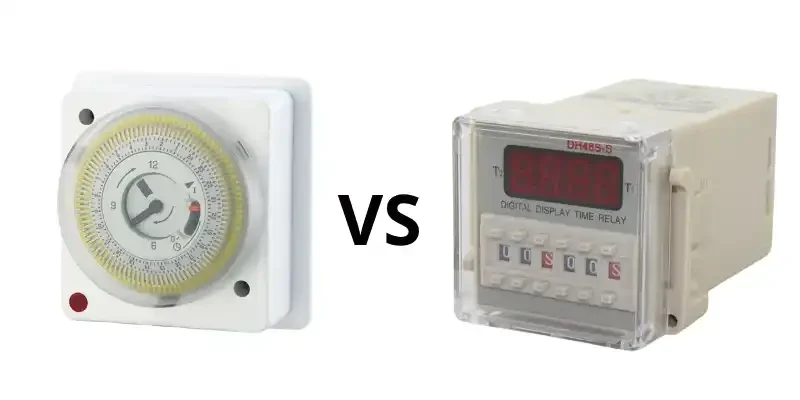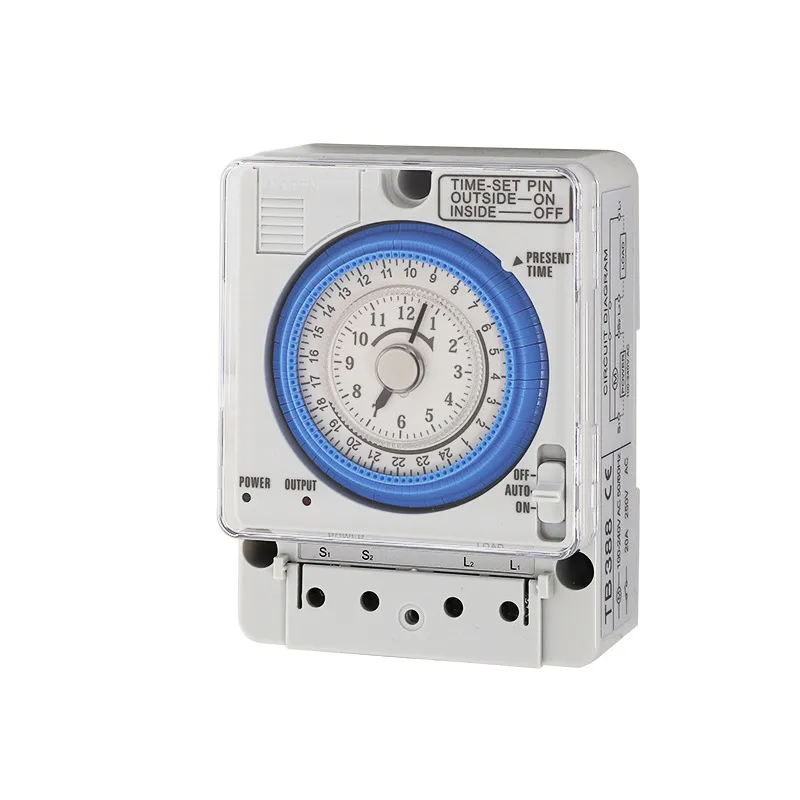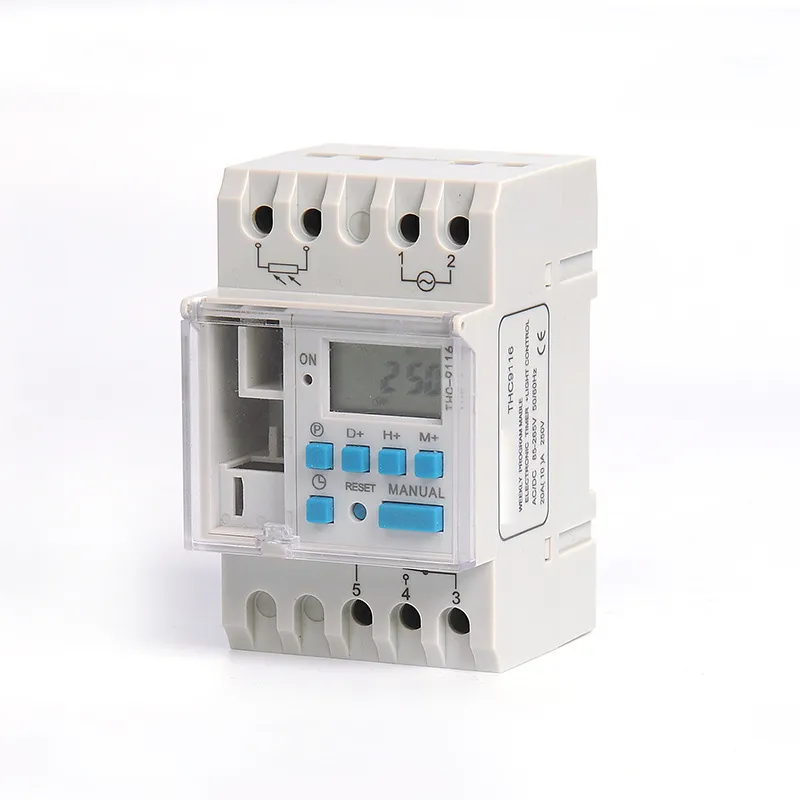Механічні та цифрові таймери мають явні переваги для керування електричними пристроями, причому механічні таймери забезпечують простоту та доступність, тоді як цифрові таймери пропонують розширені функції та більшу точність для більш складних потреб у синхронізації.
Механічна vs цифрова функціональність
Механічні таймери працюють за допомогою рухомих частин, таких як шестерні та пружини, а користувачі встановлюють час, повертаючи циферблат або регулюючи ручку. На відміну від них, цифрові таймери використовують електронні технології, часто оснащені РК- або світлодіодними дисплеями та програмованими налаштуваннями для точних інтервалів часу. У той час як механічні таймери покладаються на частоту мережі, що може призвести до незначних відхилень з часом, цифрові таймери зазвичай використовують кварцові генератори або інші електронні компоненти для більш точного вимірювання часу.
Вибір між ними часто залежить від конкретних потреб:
- Механічні таймери відрізняються простотою і доступністю, що робить їх ідеальними для базових завдань хронометражу.
- Цифрові таймери пропонують розширені функції, такі як складне планування та більшу точність, що підходить для складних вимог до часу.
- Розмір та естетика також відрізняються: механічні таймери, як правило, більші та громіздкіші, тоді як цифрові таймери часто менші за розміром та візуально привабливіші в сучасних умовах.
Дизайн і розмір
Механічні таймери: Ці таймери, як правило, більші та громіздкіші через те, що в них багато рухомих частин. Вони часто мають циферблати або ручки для налаштування таймера і виготовляються з таких матеріалів, як сталь, що може зробити їх менш естетичними в сучасному домашньому інтер'єрі.
Цифрові таймери: Цифрові таймери, як правило, менші за розміром і спроектовані з урахуванням елегантної естетики. Вони часто оснащені РК-дисплеями та кнопками, що робить їх візуально привабливими і полегшує інтеграцію в сучасний інтер'єр.
Простота використання
Зручність використання значно відрізняється між механічними та цифровими таймерами. Механічні таймери, як правило, простіші в управлінні, мають прості циферблати та кнопки, що робить їх зручними для виконання базових завдань. Цифрові таймери, хоча й пропонують розширені функції, можуть бути складнішими в налаштуванні через велику кількість кнопок і варіантів програмування. Ця складність може стати бар'єром для деяких користувачів, особливо тих, хто віддає перевагу простим інтерфейсам або менш схильний до технологій.
- Міркування щодо вартості: Механічні таймери, як правило, більш доступні за ціною, що робить їх економічно вигідним вибором для простих застосувань.
- Цифрові таймери мають вищу початкову вартість, але потенційно можуть заощадити гроші в довгостроковій перспективі завдяки енергоефективності та зменшенню потреби в технічному обслуговуванні.
- Енергоспоживання: Цифрові таймери часто споживають менше енергії, ніж механічні, що сприяє їхній довгостроковій економічній ефективності.
Обслуговування
Механічні таймери: Потребують більшого обслуговування через рухомі частини, які з часом можуть зношуватися. Для забезпечення належного функціонування може знадобитися регулярне чищення.
Цифрові таймери: Зазвичай потребують меншого обслуговування, оскільки не мають механічних деталей. Однак вони можуть бути більш схильні до пошкоджень через проблеми з електрикою або фактори навколишнього середовища, такі як вологість.
Енергоспоживання
Механічні таймери: Зазвичай більш енергоефективні, споживають близько 1 Вт на годину. Це робить їх придатними для ситуацій, де важливим є енергозбереження.
Цифрові таймери: Зазвичай споживають близько 2 Вт на годину через свої електронні компоненти. Вони потребують безперервного живлення, що може обмежити їх використання в місцях, де немає електричних розеток.
Ціна
Механічні таймери: Як правило, вони більш доступні за ціною, ніж цифрові таймери, що робить їх економічно вигідним вибором для базових застосувань, які не вимагають точності.
Цифрові таймери: Зазвичай дорожчі через розширені функції та можливості. Їх рекомендують користувачам, яким потрібна гнучкість і точність у застосуванні хронометражу.
Довговічність і придатність до застосування
Довговічність є ключовим фактором при виборі між механічними та цифровими таймерами. Механічні таймери відомі своєю надійністю, особливо у складних промислових умовах, де вони можуть витримувати великі електричні навантаження та суворі умови експлуатації. Така довговічність робить їх ідеальними для застосувань, що вимагають довготривалої надійності без частої заміни. Цифрові таймери, хоча і пропонують розширені функції, можуть бути більш чутливими до факторів навколишнього середовища, таких як коливання температури або електромагнітні перешкоди.
- Для базових, доступних за ціною потреб у налаштуванні часу в житлових приміщеннях часто достатньо механічних таймерів.
- У промисловій автоматизації або сценаріях, що вимагають точного, складного планування, цифрові таймери мають перевагу завдяки своїм розширеним функціям і більшій точності.
- Для зовнішніх застосувань або в екстремальних умовах механічні таймери можуть бути кращим вибором через їхню стійкість до зовнішніх впливів.
Вибір правильного таймера
Обираючи між механічними та цифровими таймерами, враховуйте наступні фактори:
- Складність програми: Обирайте механічні таймери для простих і зрозумілих завдань, як-от базове планування увімкнення/вимкнення. Вибирайте цифрові таймери для складних завдань, що вимагають точного часу або декількох розкладів.
- Вимоги до точності: Якщо висока точність має вирішальне значення, цифрові таймери пропонують чудову точність і можливість програмування.
- Простота використання: Механічні таймери, як правило, простіші в управлінні, тоді як цифрові таймери можуть потребувати навігаційних меню, але пропонують більш розширені функції.
- Умови навколишнього середовища: Для суворих промислових умов механічні таймери часто виявляються довговічнішими.
- Бюджетні обмеження: Механічні таймери, як правило, більш доступні за ціною, що робить їх економічно вигідними для базових потреб.
- Наявність живлення: У місцях, де немає надійної електрики, краще використовувати механічні таймери, які не потребують постійного живлення.
Зрештою, оцініть свої конкретні потреби, враховуючи такі фактори, як бажані функції, бюджет і середовище, в якому буде працювати таймер, щоб зробити найкращий вибір для вашого застосування.
Висновок
Вибирайте механічні таймери для базових, надійних та економічно ефективних потреб у налаштуванні часу. Цифрові таймери обирайте, якщо вам потрібні розширені функції та можливість програмування.




